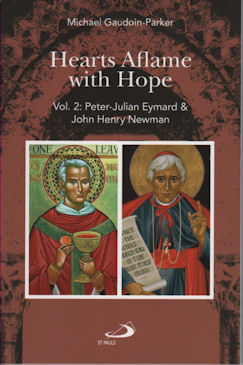
|
Posted
November 27, 2012
Book: Hearts Aflame with Hope: Vol. 2: Peter-Julian Eymard and John Henry Newman Author: Michael Gaudoin-Parker St. Paul's, Staten Island, NY. 2012. pp. 154 An Excerpt from the Jacket:
An Excerpt from the Book: In describing the qualities of a preacher Newman here emphasized the importance of being transparent and coherent in his life with what is uttered. This draws people more readily than any eloquence. He himself bore witness to God's providential faithfulness as a dispenser of divine grace, overseer in his people's needs and also an intercessor in lifting them up in prayer before God's loving merciful kindness. He thus inspired confidence and won the trust of his hearers by living out the well-worn expression: practicing he preached. While appreciating that even the best of people can waver and falter, he maintained the importance of being steady of purpose and stable in manner of living: "I have ever made consistency the mark of a Saint." The task behooving a preacher, as he clearly saw, thus involved patience and perseverance in confronting both in his flock as well as in himself a residual sluggishness and feebleness of will to obey God because of inveterate, ingrained sinful habitual ways of acting and modes of being: "The Minister of Christ has to teach His sinful people a perfect obedience: and does not know how to set about it or how to insist on any precept, so as to secure it from being misunderstood and misapplied. He sees men are acting upon low motives and views, and finds it impossible to raise their minds all at once, however clear his statements of Truth. He feels that their good deeds might be done in a much better manner . . .so is it with all of us. Ministers as well as people; it is so with the most advanced of Christians while in the body, and God sees it." Apart from warning against lethargy in spiritual seriousness, Newman's "chief target" in his preaching was "spiritual complacency," for, "outward behavior, however good, for example, is no guarantee of anything." He impugned self-righteousness of any kind, particularly that detestable form of the falsity of middle-class Victorian "respectability" which was considered the mark of being religious. This arrogance in attitude --- in which sins are hidden and disguised, conscience is stifled --- deprived persons of a due awe in humility before God, to whom alone the honor of worship and adoration is due. Being vigilant and prayerful in hope is a frequent theme in his preaching. Many years later at the university church in Dublin he said: "One of these characteristics of a Christian spirit, springing from the three theological virtues, and then in turn defending and strengthening them, is that habit of waiting and watching . . .and the same habit is also a mark of the children of the Church, and a note of her divine origin." Table of Contents: Foreward (V. Fr. Norman Pelletier, S.S.S.) Preface (Archbishop Piero Marini) Prelude: Raising of hope beyond hope 3. Peter-Julian Eymard (1811-1868): Disciple and Apostle of the Eucharist 4. John Henry Newman (1808-1890): Seeker of Truth in Communion Postlude: Hearts Aflame with Hope, Pope John Paul II and Mother Teresa |
|
